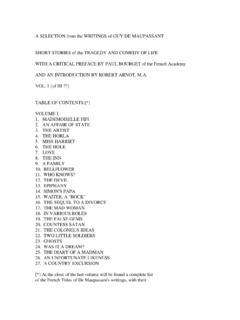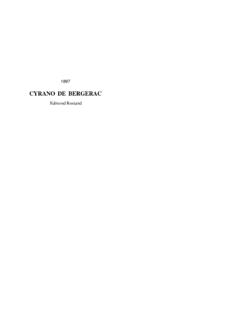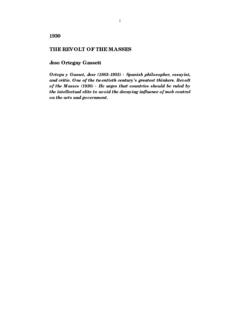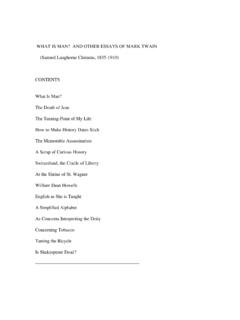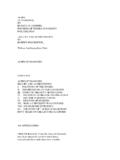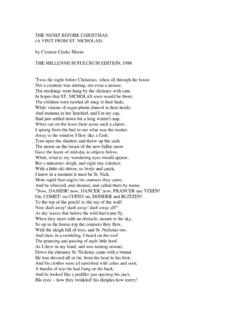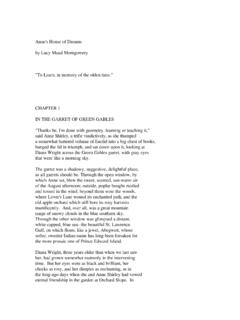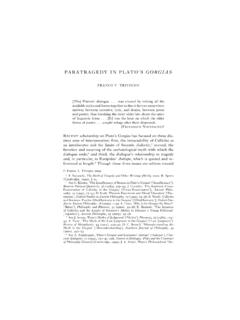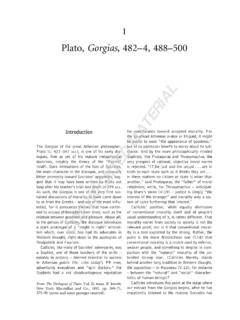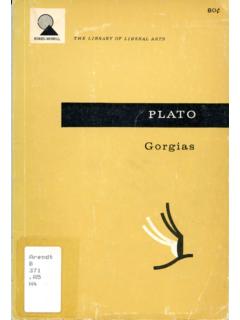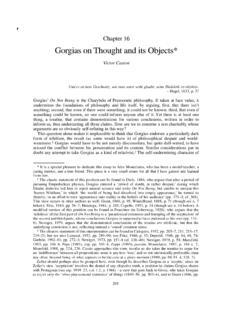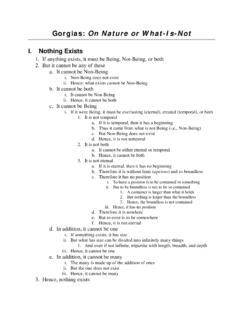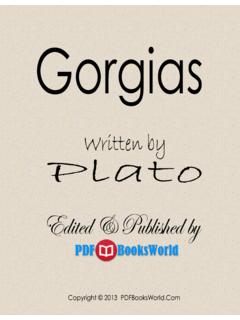Transcription of 370 BC GORGIAS Plato translated by Benjamin Jowett
1 1370 BCGORGIASP latotranslated by Benjamin JowettPlato (~428-~348 BC) - One of the greatest and most influentialGreek philosophers, he was a disciple of Socrates and the teacherof Aristotle. Most of his works are written dialogues, many withSocrates as the main character. Plato founded a school ofphilosophy known as the Academy. GORGIAS (370 BC) - Platoasserts the absolute supremacy of justice through the dramaticportraiture of Socrates in his opposition to the OF THE DIALOGUE:CALLICLESSOCRATESCHAEREPHONGORG IASPOLUSGORGIASS cene: The house of The wise man, as the proverb says, is late for a fray, butnot for a And are we late for a feast?
2 Cal Yes, and a delightful feast;for GORGIAS has just been exhibiting to us many fine It is not my fault, Callicles; our friend Chaerephon is to blame;for he would keep us loitering in the Never mind, Socrates; the misfortune of which I havebeen the cause I will also repair; for GORGIAS is a friend of mine,and I will make him give the exhibition again either now, or, if youprefer, at some other What is the matter, Chaerephon-does Socrates want to hearGorgias? Chaer Yes, that was our intention in Come into my house, then; for GORGIAS is staying with me, andhe shall exhibit to Very good, Callicles; but will he answer our questions? for Iwant to hear from him what is the nature of his art, and what it iswhich he professes and teaches; he may, as you [Chaerephon]suggest, defer the exhibition to some other There is nothing like asking him, Socrates; and indeed toanswer questions is a part of his exhibition, for he was saying onlyjust now, that any one in my house might put any question to him,and that he would How fortunate!
3 Will you ask him, Chaerephon-?Chaer What shall I ask him? Soc Ask him who he What do you mean? Soc I mean such a question as wouldelicit from him, if he had been a maker of shoes, the answer that heis a cobbler. Do you understand? Chaer I understand, and will askhim: Tell me, GORGIAS , is our friend Callicles right in saying thatyou undertake to answer any questions which you are asked? GORGIAS Quite right, Chaerephon: I was saying as much only just3now; and I may add, that many years have elapsed since any onehas asked me a new Then you must be very ready, Of that, Chaerephon, you can make Yes, indeed, and if you like, Chaerephon, you may make trialof me too, for I think that GORGIAS , who has been talking a longtime, is And do you, Polus, think that you can answer better thanGorgias?
4 Pol What does that matter if I answer well enough foryou? Chaer Not at all:-and you shall answer if you Ask:Chaer My question is this: If GORGIAS had the skill of hisbrother Herodicus, what ought we to call him? Ought he not tohave the name which is given to his brother? Pol Then we should be right in calling him a physician? Pol And if he had the skill of Aristophon the son of Aglaophon,or of his brother Polygnotus, what ought we to call him? PolClearly, a But now what shall we call him-what is the art in which heis O Chaerephon, there are many arts among mankind which areexperimental, and have their origin in experience, for experiencemakes the days of men to proceed according to art, andinexperience according to chance, and different persons in differentways are proficient in different arts, and the best persons in thebest our friend GORGIAS is one of the best, and the art in which he isa proficient is the Polus has been taught how to make a capital speech, GORGIAS ;but he is not fulfilling the promise which he made to What do you mean, Socrates?
5 Soc I mean that he has notexactly answered the question which he was Then why not ask him yourself? Soc But I would much ratherask you, if you are disposed to answer: for I see, from the fewwords which Polus has uttered, that he has attended more to theart which is called rhetoric than to What makes you say so, Socrates? Soc Because, Polus, whenChaerephon asked you what was the art which GORGIAS knows,you praised it as if you were answering some one who found faultwith it, but you never said what the art Why, did I not say that it was the noblest of arts? Soc Yes,indeed, but that was no answer to the question: nobody askedwhat was the quality, but what was the nature, of the art, and bywhat name we were to describe GORGIAS .
6 And I would still beg youbriefly and clearly, as you answered Chaerephon when he askedyou at first, to say what this art is, and what we ought to callGorgias: Or rather, GORGIAS , let me turn to you, and ask the samequestion what are we to call you, and what is the art which youprofess? Gor Rhetoric, Socrates, is my Then I am to call you a rhetorician? Gor Yes, Socrates, and agood one too, if you would call me that which, in Homericlanguage, I boast myself to be. Soc I should wish to do Then pray And are we to say that you are able to make other menrhetoricians? Gor Yes, that is exactly what I profess to make them,not only at Athens, but in all And will you continue to ask and answer questions, GORGIAS ,as we are at present doing and reserve for another occasion thelonger mode of speech which Polus was attempting?
7 Will you keepyour promise, and answer shortly the questions which are asked ofyou? Gor Some answers, Socrates, are of necessity longer; but I willdo my best to make them as short as possible; for a part of myprofession is that I can be as short as any That is what is wanted, GORGIAS ; exhibit the shorter methodnow, and the longer one at some other Well, I will; and you will certainly say, that you never heard aman use fewer Very good then; as you profess to be a rhetorician, and a makerof rhetoricians, let me ask you, with what is rhetoric concerned: Imight ask with what is weaving concerned, and you would reply(would you not?), with the making of garments?
8 Gor And music is concerned with the composition of melodies? GorIt By Here, GORGIAS , I admire the surpassing brevity of Yes, Socrates, I do think myself good at I am glad to hear it; answer me in like manner about rhetoric:with what is rhetoric concerned? Gor With What sort of discourse, GORGIAS ?-such discourse as would teachthe sick under what treatment they might get well? Gor Then rhetoric does not treat of all kinds of discourse? GorCertainly And yet rhetoric makes men able to speak?Gor And to understand that about which they speak? Gor But does not the art of medicine, which we were just nowmentioning, also make men able to understand and speak aboutthe sick?
9 Gor Then medicine also treats of discourse? Gor Of discourse concerning diseases? Gor Just And does not gymnastic also treat of discourse concerning thegood or evil condition of the body? Gor Very And the same, GORGIAS , is true of the other arts:-all of themtreat of discourse concerning the subjects with which they severallyhave to Then why, if you call rhetoric the art which treats of discourse,and all the other arts treat of discourse, do you not call them arts ofrhetoric? Gor Because, Socrates, the knowledge of the other arts hasonly to do with some sort of external action, as of the hand; butthere is no such action of the hand in rhetoric which works andtakes effect only through the medium of discourse.
10 And therefore Iam justified in saying that rhetoric treats of I am not sure whether I entirely understand you, but I dare sayI shall soon know better; please to answer me a question:-youwould allow that there are arts? Gor As to the arts generally, they are for the most part concernedwith doing, and require little or no speaking; in painting, andstatuary, and many other arts, the work may proceed in silence;and of such arts I suppose you would say that they do not comewithin the province of You perfectly conceive my meaning, But there are other arts which work wholly through themedium of language, and require either no action or very little, as,for example, the arts of arithmetic, of calculation, of geometry, andof playing draughts.

